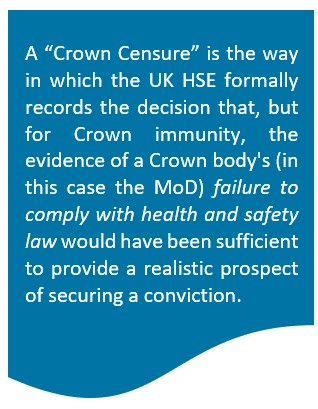Two deaths of military divers

What happened?
Incident 1 – UK
The UK Health and Safety Executive has issued the Ministry of Defence (MoD) with a “Crown Censure” after a military diver died during training. The UK HSE press release, dated 2 September 2020, is found here.
In March 2018, a diver being trained was brought back to surface after he stopped responding to lifeline signals while he was underwater. He was sadly pronounced dead after CPR was performed. He had been on a training course at the National Diving and Activity Centre in Chepstow. The diver and his dive buddy were tasked with attaching a distance line from the base of a shot line to the underwater wreck of a helicopter at a depth of 27m. When he was recovered his cylinders were found to be empty.
The UK HSE served two Crown Improvement Notices relating to the failure to train all army divers how to undertake air endurance calculations and to assess the risk of a diver running out of air.
Julian Tuvey, a HSE inspector who specialises in diving, said: “This was a tragedy for all concerned however just like any other employer, the MoD has a responsibility to reduce dangers to its personnel, as far as they properly can. The scenario of a diver running out of air is a very real risk that needs to managed.”
The Ministry of Defence accepted the Crown Censure and hence admitted breaching its duty under Section 2(1) of the Health and Safety at Work etc. Act 1974 in that they failed to ensure, so far as was reasonably practicable, the health, safety and welfare at work of all its employees, in relation to the risks associated with diving exercises.
Incident 2 – New Zealand
The New Zealand Defence Force was sentenced at the Auckland District Court for health and safety failings following the death of a trainee diver. In March 2019 a group of trainees was taking part in an 18 week advanced diving course. Following a full day of dive exercises, the trainees were undertaking a night dive when one of the trainees was identified as in trouble and pulled unresponsive from the water. The trainee later died as a result of a brain injury due to oxygen deprivation.
Investigation found the exercise went against the Defence Force’s own training standards. It also found trainees were covertly switching their breathing apparatus from nitrox to oxygen mode, which ran the risk of leading to oxygen deprivation. This switching activity was known between trainees but not to their supervisors in the Defence Force.
Further information can be found in the press release here: https://worksafe.govt.nz/about-us/news-and-media/defence-force-sentenced-over-diver-fatality/
IMCA notes: These incidents reinforces IMCA’s published position that self-contained underwater breathing apparatus (SCUBA) has inherent limitations and is not a suitable technique for work covered by the IMCA International Code of Practice for Offshore Diving (IMCA D 014).
Members should refer to IMCA D 033 Limitations in the Use of SCUBA Offshore.
Safety Event
Published: 23 October 2020
Download: IMCA SF 30/20
IMCA Safety Flashes
Submit a Report
IMCA Safety Flashes summarise key safety matters and incidents, allowing lessons to be more easily learnt for the benefit of all. The effectiveness of the IMCA Safety Flash system depends on Members sharing information and so avoiding repeat incidents. Please consider adding [email protected] to your internal distribution list for safety alerts or manually submitting information on incidents you consider may be relevant. All information is anonymised or sanitised, as appropriate.
IMCA’s store terms and conditions (https://www.imca-int.com/legal-notices/terms/) apply to all downloads from IMCA’s website, including this document.
IMCA makes every effort to ensure the accuracy and reliability of the data contained in the documents it publishes, but IMCA shall not be liable for any guidance and/or recommendation and/or statement herein contained. The information contained in this document does not fulfil or replace any individual’s or Member's legal, regulatory or other duties or obligations in respect of their operations. Individuals and Members remain solely responsible for the safe, lawful and proper conduct of their operations.
